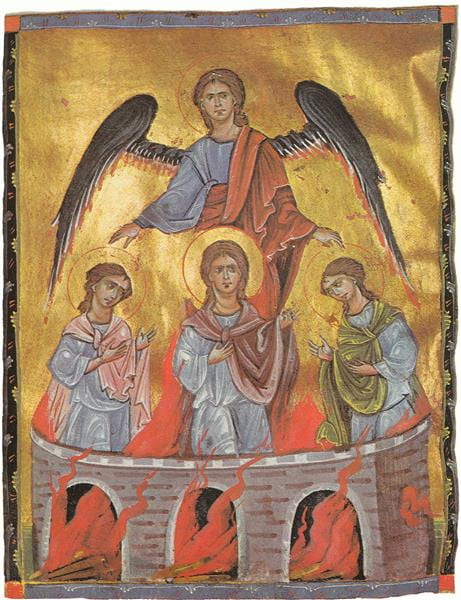In The Poetics and Politics of Witnessing, Derrida argues that trust in a witness’ account is derived from the belief of those listening. Derrida explains, “Bearing witness appeals to the act of faith, and thus takes place in the space of pledged or sworn word” (Derrida, 75). Here, Derrida notes that the relationship between a witness and an audience is one of faith. To prove this faith an oath must occur. Derrida finds oaths are signified when “someone engages himself with regard to someone else” (Derrida, 83). Examples of oaths include everything from verbalizing commitments to physical acts like wearing a wedding band. The oath evokes a religious connotation, as religions demand a similar faith in the unknown through belief in God.
This relationship between witness and God is exemplified in the biblical book of Daniel, particularly through the story of Hananiah, Mishael, and Azariah. The three Hebrew men are ordered by the King of Babylon, Nebuchadnezzar, to be burned alive after they refuse to worship the idol of the King instead of their God (Daniel, 261). Nebuchadnezzar then throws these three individuals into a furnace. However, they are not harmed or killed in this act. Rather, the King witnesses “a miracle going on in the torture” and they are protected via “the glory of God” (Daniel, 265). In this scene, witnessing occurs on many levels. The Hebrew men demonstrate their faith through not worshiping the King’s gold statue, with God serving as the all-knowing audience who is the judge of their actions. In turn, the oath the Hebrew men have to God is a symbiotic pledge. Not only do the men pledge to God, but God pledges to them. This is seen in their speech during the furnace. Azariah reminds God about the agreement he had with the three men’s ancestors noting, “You promised them by utterances that in distant days you would increase their offspring” and Azariah commands God to “Fulfill now that oath” (Daniel, 267). God witnesses the actions of humans, and humans witness the actions of God. This relationship between God and his followers is maintained through shared commitments. As Derrida explains, “I can lie, perjure, or betray only by promising, under oath” (Derrida, 84).
This then complicates our understanding of God’s power. God and the three Hebrew men can only betray their oaths to one another, because they created oaths to one another. These men command God to act; so what is the purpose of this ostensible limitation in God’s power? In order to build and maintain his following, God constructs relationships through mutual faith. God must bear witness to humans, but to have faith humans must also bear witness to God. In the story of the furnace, witnessing in Daniel serves to bring individuals closer to God. God builds his following through converting the town, while also and maintaining his following by fulfilling the oath.
This is represented in the transformation of the King of Babylon. During the furnace, those who do not have faith cannot witness the relationship between God and the three Hebrew men. Nebuchadnezzar can see the men’s safety during the fire, but the miracle still strikes him as alien (Daniel, 267). This is the beginning of the King’s spiritual transformation. While he can literally see the miracle, his lack of faith bars him from being a witness due to his intellectual darkness. Derrida argues that witnesses can only witness on the condition they have self-presence during the events (Derrida, 79). The King’s lack of faith prevents this higher level of self-consciousness from occurring. However, by God allowing humans to witness his miracles it strikes faith in the viewer. Ultimately, it transforms the King. Faith is a necessary part of humans’ continued belief in God. This highlights the importance of reciprocal witnessing and accountability for God and his followers.
